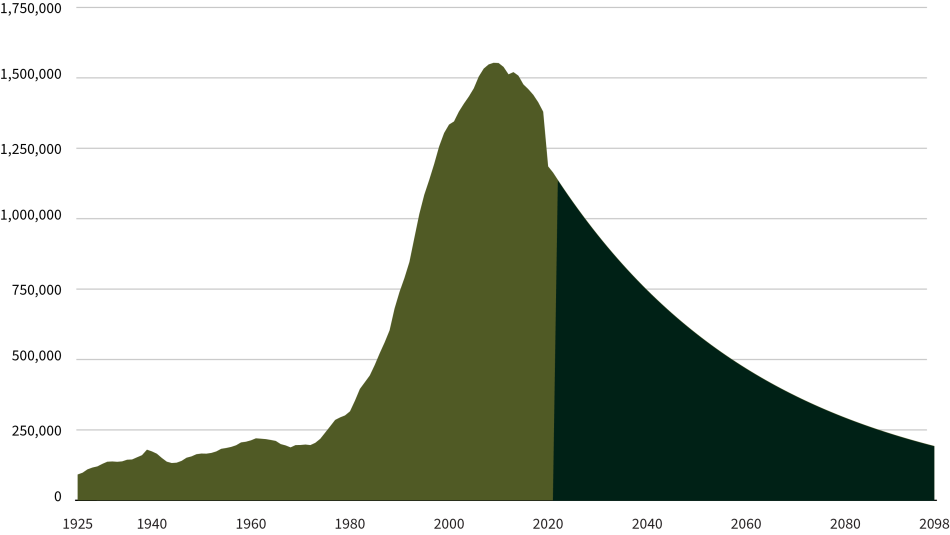Hey y’all,
This is my final civic issues post, and I’m going to wrap up the discussion on mass incarceration. Now that you know about recidivism, the racial and socioeconomic disparities in incarceration rates, and the true intentions and repercussions of the War on Drugs, we’re in a good position to look at where the issue is today and how we can approach solving the incarceration crisis in the coming years.
The good news is that the decarceration rate is now higher than the incarceration rate, and the U.S. prison population has declined over 25% since its peak in 2009. The more unsavory news is that, at the current pace of decarceration, it would take 75 years—until 2098—to return to 1972’s prison population. That would bookmark almost 130 years of mass incarceration in the U.S. and be one of the longest lasting scars on our country’s legacy.

The graph above shows the predicted decline of the U.S. prison population, but the snail-like pace of it is disheartening when you think of the families that will continue to be deprived of their loved ones. There was a sharp decline of about 14% in 2020, but that was due to pandemic-related policies regarding overcrowding and the risks of the Coronavirus. Since then, the pre-pandemic rate of decline has been renewed, moving at about half the speed of the spike that began in the 80s.
This decline is due to growing bipartisan consensus on the need for criminal justice reform. Many policymakers and activists have advocated for changes in sentencing laws, such as the reduction of mandatory minimum sentences for nonviolent offenses and alternatives to incarceration for individuals with substance abuse or mental health issues. Some states have shifted their approach to drug offenses, emphasizing treatment and rehabilitation over lengthy prison sentences. Drug policy reforms, diversion programs, community-based initiatives, and changes in public attitudes have all contributed as well to the reduction of the prison population.
To speed up the release of prisoners and lower conviction rates, we must implement more innovative sentencing and bail reform, expand upon community-based programs, promote rehabilitation programs, and introduce education and job training to released convicts in attempts to reduce recidivism. Other creative ideas are community policing strategies that build positive relationships between police and the communities they serve, accountability measures that address misconduct within law enforcement, and transparency measures that include regular reporting of data on arrests, sentencing, and incarceration to monitor any emerging disparities or issues.
Another reason that many people approve of decarceration now is that the criminalization of black and brown people has been consistently debunked as a harmful stereotype in the media. Over-incarcerated individuals like African Americans and Latinos are now seen less as criminals and more as victims of a corrupt system. That being said, there are still numerous Americans, some with lots of political power, who’d like to see these people of color locked up or deported, and until their minds can be changed or their power stripped, we still won’t have true justice in this country.
While these changes are moving in a positive direction, they are incredibly slow. Organizations like The Sentencing Project, Prison Policy Initiative, the Brennan Center for Justice, and many others are all fighting hard to generate policies and institutions that will attack the incarceration rates that hold us back from actually being the “Land of the Free”. Hopefully their movements will continue to gain following and support in the coming years, and we can eventually work as a nation to completely restructure our justice system into one that is truly “just”.
image link: https://www.sentencingproject.org/policy-brief/ending-50-years-of-mass-incarceration-urgent-reform-needed-to-protect-future-generations/
The Sentencing Project: https://www.sentencingproject.org/
Prison Policy Initiative: https://www.prisonpolicy.org/
Brennan Center for Justice: https://www.brennancenter.org/
Thanks for reading and stay curious!
~Asim


